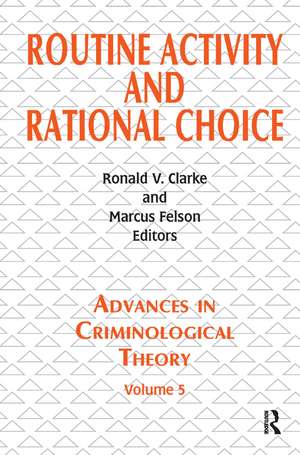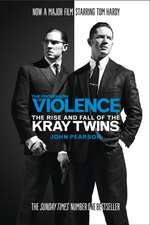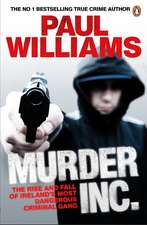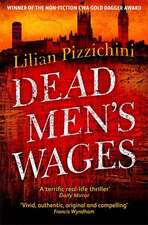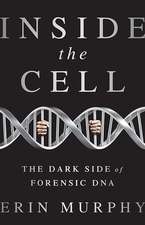Routine Activity and Rational Choice: Volume 5: Advances in Criminological Theory
Editat de Ronald V. Clarke, Marcus Felsonen Limba Engleză Hardback – 29 ian 2018
| Toate formatele și edițiile | Preț | Express |
|---|---|---|
| Paperback (1) | 444.80 lei 6-8 săpt. | |
| Taylor & Francis – 31 aug 2004 | 444.80 lei 6-8 săpt. | |
| Hardback (1) | 1000.27 lei 6-8 săpt. | |
| Taylor & Francis – 29 ian 2018 | 1000.27 lei 6-8 săpt. |
Din seria Advances in Criminological Theory
-
 Preț: 327.48 lei
Preț: 327.48 lei -
 Preț: 337.22 lei
Preț: 337.22 lei -
 Preț: 432.29 lei
Preț: 432.29 lei -
 Preț: 389.38 lei
Preț: 389.38 lei -
 Preț: 416.82 lei
Preț: 416.82 lei -
 Preț: 395.04 lei
Preț: 395.04 lei -
 Preț: 489.26 lei
Preț: 489.26 lei - 14%
 Preț: 299.52 lei
Preț: 299.52 lei - 15%
 Preț: 297.57 lei
Preț: 297.57 lei -
 Preț: 375.54 lei
Preț: 375.54 lei -
 Preț: 391.22 lei
Preț: 391.22 lei - 13%
 Preț: 351.24 lei
Preț: 351.24 lei -
 Preț: 349.10 lei
Preț: 349.10 lei -
 Preț: 416.22 lei
Preț: 416.22 lei -
 Preț: 449.63 lei
Preț: 449.63 lei -
 Preț: 393.52 lei
Preț: 393.52 lei -
 Preț: 444.80 lei
Preț: 444.80 lei - 18%
 Preț: 999.51 lei
Preț: 999.51 lei - 16%
 Preț: 260.54 lei
Preț: 260.54 lei - 16%
 Preț: 262.73 lei
Preț: 262.73 lei -
 Preț: 342.70 lei
Preț: 342.70 lei - 14%
 Preț: 299.52 lei
Preț: 299.52 lei -
 Preț: 441.91 lei
Preț: 441.91 lei -
 Preț: 395.37 lei
Preț: 395.37 lei -
 Preț: 426.46 lei
Preț: 426.46 lei -
 Preț: 353.62 lei
Preț: 353.62 lei -
 Preț: 389.66 lei
Preț: 389.66 lei - 30%
 Preț: 769.59 lei
Preț: 769.59 lei
Preț: 1000.27 lei
Preț vechi: 1219.84 lei
-18% Nou
Puncte Express: 1500
Preț estimativ în valută:
191.46€ • 208.04$ • 160.93£
191.46€ • 208.04$ • 160.93£
Carte tipărită la comandă
Livrare economică 21 aprilie-05 mai
Preluare comenzi: 021 569.72.76
Specificații
ISBN-13: 9781138532137
ISBN-10: 1138532134
Pagini: 428
Dimensiuni: 152 x 229 mm
Greutate: 0.45 kg
Ediția:1
Editura: Taylor & Francis
Colecția Routledge
Seria Advances in Criminological Theory
Locul publicării:Oxford, United Kingdom
ISBN-10: 1138532134
Pagini: 428
Dimensiuni: 152 x 229 mm
Greutate: 0.45 kg
Ediția:1
Editura: Taylor & Francis
Colecția Routledge
Seria Advances in Criminological Theory
Locul publicării:Oxford, United Kingdom
Cuprins
Introduction: Criminology, Routine Activity, and Rational Choice; One: Extending the Reach; 1: Searching for Suitable Co-offenders; 2: A Rational Choice Theory of Corporate Crime; 3: Drivers Who Drink and Rational Choice: Random Breath Testing and the Process of Deterrence; 4: Gun Use in Crime, Rational Choice, and Social Learning Theory; 5: Predatory and Dispute-related Violence: A Social Interactionist Approach; 6: Tinderbox Criminal Violence: Neurogenic Impulsivity, Risk-taking, and the Phenomenology of Rational Choice; 7: Rational Choice, Behavior Analysis, and Political Violence; 8: Ransom Kidnapping in Sardinia, Subcultural Theory and Rational Choice; 9: Successful Criminal Careers: Toward an Ethnography within the Rational Choice Perspective; Two: Bridging the Gaps; 10: The Rational Choice/Opportunity Perspectives as a Vehicle for Integrating Criminological and Victimological Theories; 11: Environment, Routine, and Situation: Toward a Pattern Theory of Crime; 12: A Strategic Analysis of Crime: Criminal Tactics as Responses to Precriminal Situations; 13: Conscience, Opportunity, Rational Choice, and Crime; 14: Crime Prevention through Environmental Design, Opportunity Theory, and Rational Choice Models; 15: Theories of Action in Criminology: Learning Theory and Rational Choice Approaches
Descriere
Structuralism began in linguistics and was enlarged by Claude Levi-Strauss into a new way of thinking that views our world as consisting of relationships between structures we create rather than of objective realities. The Age of Structuralism examines the work of seven writers who either expanded upon or reacted against Levi-Strauss.In a panoramic overview of the origins of deconstructionism and its critics, Edith Kurzweil offers a lucid and penetrating portrait of the movement that dominated French intellectual life for much of the postwar era, and which continues to influence the French intellectual milieu. She explains Levi-Strauss's strikingly original contributions, then proceeds to illuminate the ideas of crusaders and critics. The key figures dealt with include: Louis Althusser, who reinterpreted Marxism through a rereading of Marx's texts with the help of structuralist techniques; Henri Lefebvre, who remained faithful to Marx's humanism and was one of the earliest and most vehement critics of structuralism; Paul Ricoeur, whose phenomenology sought to reconcile ethical theory and intellectual pursuits; Alain Touraine, a socialist whose sociology of political action led him to dismiss structuralist concerns; Jacques Lacan, who criticized ego-oriented psychoanalytic theory and practice, and whose own work emphasized linguistic structures in psychoanalysis; Roland Barthes, whose literary criticism, in its determination to reject all false notions and systems, led to a highly idiosyncratic approach that drew upon all systems; and finally, Michel Foucault, whose social histories of deviance, medicine, psychology, grammar, language, sexuality criminology, have reexamined every facet of social theory.Placing these major figures in the context of political, historical, and psychoanalytic currents of the time, The Age of Structuralism is a commanding and far-reaching study of a decisive epoch in intellectual history. Kurzweil's new
